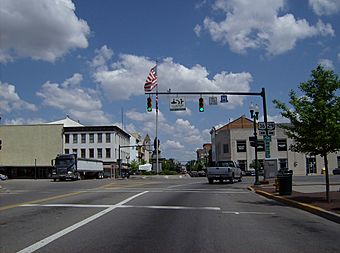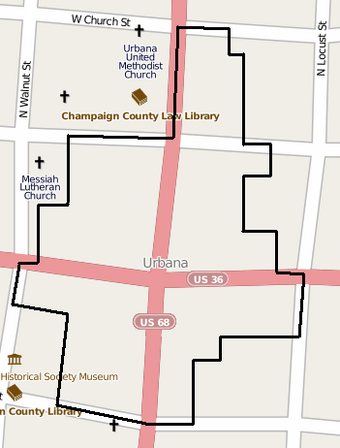Urbana Monument Square Historic District facts for kids
Quick facts for kids |
|
|
Urbana Monument Square Historic District
|
|

Center of the district
|
|

Map of the district
|
|
| Location | Roughly bounded by Market, Walnut, Church, and Locust Sts., Urbana, Ohio |
|---|---|
| Area | 25 acres (10 ha) |
| Built | 1805 |
| Architectural style | Late Victorian, Federal |
| NRHP reference No. | 84002909 |
| Added to NRHP | March 1, 1984 |
The Urbana Monument Square Historic District is a special area in the middle of Urbana, Ohio, United States. It's called a historic district because it has many old and important buildings. This part of Urbana has been a public square and a busy business center since the town first started.
The district is home to buildings built in several cool styles. These include the Federal, Georgian, Italianate, Richardsonian Romanesque, and Second Empire styles. In 1984, this area was added to the National Register of Historic Places. This happened because of its unique buildings and its important role in local history. The district covers about 25 acres and includes 66 buildings that help tell its story.
Contents
What is a Historic District?
A historic district is like a special neighborhood. It's an area that has been officially recognized for its history or its unique architecture. These districts are protected to help save old buildings and places. This way, future generations can learn about the past.
When an area becomes a historic district, it means its buildings are important. They show how people lived and built things long ago. The Urbana Monument Square Historic District is a great example of this. It helps us see what Urbana looked like in earlier times.
Buildings That Tell a Story
Within a historic district, buildings are often called "contributing properties." These are the buildings that add to the area's historic feel and importance. They fit the time period and style that makes the district special. The Urbana Monument Square Historic District has 66 of these contributing properties.
Some buildings in a historic district might be called "non-contributing properties." These buildings might be newer or have been changed a lot. They don't quite fit the historic look of the area. The Urbana district has 13 of these non-contributing buildings.
A Look at the Architecture Styles
The buildings in the Urbana Monument Square Historic District show off many different building styles. Each style has its own special features. Looking at them is like taking a trip through time!
Federal Style
The Federal style was popular in the United States from about 1780 to 1830. Buildings in this style often look very balanced and simple. They might have smooth brick walls and decorative details like fanlights above doors.
Georgian Style
The Georgian style was common even earlier, from the 1700s to the early 1800s. These buildings are usually symmetrical, meaning both sides look the same. They often have a grand, formal look with evenly spaced windows.
Italianate Style
The Italianate style became popular in the mid-1800s. You can often spot these buildings by their tall, narrow windows and wide, overhanging roofs. The roofs might have decorative brackets underneath them.
Richardsonian Romanesque Style
The Richardsonian Romanesque style was popular in the late 1800s. Buildings in this style often look very strong and sturdy. They use rough stone, round arches, and have a heavy, castle-like feel.
Second Empire Style
The Second Empire style was also popular in the mid to late 1800s. Its most famous feature is the "mansard roof." This is a special type of roof that has four slopes, with the lower slope being steeper. It often has dormer windows sticking out of it.
Why is it on the National Register?
The National Register of Historic Places is the official list of the nation's historic places. It's managed by the United States government. Being on this list means a place is important to the history of the country, a state, or a local community.
The Urbana Monument Square Historic District was added to this important list on March 1, 1984. It was recognized for two main reasons. First, its amazing collection of different architectural styles. Second, its strong connection to the history of Urbana, Ohio. Protecting this district helps keep Urbana's past alive for everyone to see and learn from.
 | Precious Adams |
 | Lauren Anderson |
 | Janet Collins |

